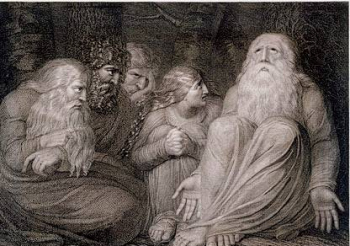Meaning of Numbers: Number Sets
Numbers found in the Bible are usually used to quantify something, to denote the sequential place of something and so on. Each day of "creation week," for example, was not given a name but rather was referenced according to its numeric position in the week (first day, second day, etc.) (Genesis 1:5 - 2:3). There are, however, fascinating exceptions that utilize sets (groups) of numbers in a unique way!
This article discusses seven Biblical occurrences involving the meaning of unique number sets. These are one, two, thousand and ten thousand, one and two only, two, three, four and five together, six and seven, and lastly seven and eight.
The Few Chasing the Many
How shall one chase a thousand, and two put ten thousand to flight, unless their Rock had sold them and the Lord had shut them up? (Deuteronomy 32:30).
The theme of Deuteronomy 32 is God chastising Israel for its faithlessness and disobedience after they left Egyptian bondage. One, two, a thousand and ten thousand in verse 30 are not meant to be taken literally. They represent a few people chasing away (gaining victory over) a much larger group.
God was conveying to his people that their ability to conquer their larger and more powerful foes was based entirely on their Rock aiding them. Their inability to do so, therefore, was due to being punished for their sins.
Response to Correction
"Behold, I am vile! What shall I answer You? I will lay my hand on my mouth. Once I have spoken; but I will not answer; yea, twice, but I will proceed no further." (Job 40:4 - 5).
The Lord's initial reprimand of Job runs through chapters 38 and 39. Verses 4 and 5 of chapter 40 is Job's brief response to his correction before the Lord continues to humble him.

The use of "once" and "twice" as a set in Job 40:4 is a form of numerical heightening (x, x+1). Its use suggests the numbers recorded should be viewed as conveying the meaning of "many" or "oftentimes" and not interpreted literally.
The All Powerful Lord
God has spoken once; twice I have heard this: that power belongs to God. Also to You, O Lord, belongs mercy; for You give to every man according to his work (Psalm 62:11 - 12).
Psalm 62 was one of the many psalms composed by King David. Once again we find that numbers are used not for their mathematical values but as a means of emphasis. David seeks to draw attention to the fact that only God has the resources we need and the ability to fully carry out his will.
Only a Few Are Left
"Yet a gleaning of grapes shall be left in it, as the shaking of an olive tree, two or three ripe olives in the top of the uppermost branch, four or five in the branches of the fruitful tree," says the Lord, God of Israel (Isaiah 17:6).
Isaiah 17:6 refers to some of the difficulties Israel would face from its enemies. The number set of two, three, four and five are meant to convey that only a few olive berries would be left on the trees. Several Biblical commentaries also believe this verse symbolically refers to only a few poor inhabitants being left alive in Israel.
God's Seven Abominations!
These six things the Lord hates; yea, seven are an abomination unto Him:
A proud look, a lying tongue, and hands that shed innocent blood, a heart that plots wicked imaginations, feet that are swift in running to evil, a false witness who speaks lies, and he who sows discord among brethren (Proverbs 6:16 - 19).
This is a classic example of one number used (in this case six) to accentuate and focus attention on another one (seven).
A proud look, or vanity, was the first sin committed in the universe (Ezekiel 28:16 - 17) and is considered one of the seven deadly sins. Lying and a false witness breaks the ninth commandment (Exodus 20:16) while murder breaks the sixth (verse 13).
Perfect Deliverance
Behold, happy is the man whom God corrects. Therefore do not despise the chastening of the Almighty. For He makes sore, and binds up; He wounds, and His hands make whole. He will deliver you in six troubles; yea, in seven no evil shall touch you (Job 5:17 - 19).
The set of six and seven, in Job 5, is used to underscore that God is willing to deliver a person from many troubles and not just a few. Seven, a Biblically sacred number representing completeness, may also symbolize the Lord's perfect ability to save a person.
Wise Scattering
Give a share to seven, and also to eight; for you know not what evil shall be upon the earth (Ecclesiastes 11:2).
For our last example we have the set of seven and eight which are not meant to represent individual numeric values. Their purpose is to convey distributing a portion of something (a share) to many.
This saying by King Solomon has been interpreted in various ways. One view is that the verse encourages prudent investments in numerous ventures since it is unknown which ones will prove successful. This strategy will increase the chance of being protected from future unseen adverse events that may come upon a person.
Another view is that Ecclesiastes 11:2 speaks of diversifying our generosity toward others, especially those in distress. By doing this we make it far more likely that we will receive aid when our time of need arises.